
(Reuters) - Japanese Prime Minister Shinzo Abe visited a shrine on Thursday that is seen by critics as a symbol of Tokyo's wartime aggression, infuriating China and South Korea and prompting concern from the United States about deteriorating ties between the North Asian neighbors.
China and South Korea have repeatedly expressed anger in the past over Japanese politicians' visits to Yasukuni Shrine, where Japanese leaders convicted as war criminals by an Allied tribunal after World War Two are honored along with those who died in battle.
The two countries have been especially touchy about visits to the shrine by serving Japanese prime ministers, and Abe is the first leader in office to pay homage at Yasukuni in the past seven years.
Business ties between China and Japan, the world's second- and third-largest economies, have improved after a downturn sparked by a flare-up last year in a row over tiny East China Sea islands controlled by Japan but also claimed by China.
But worries are growing that an unintended incident between Japanese and Chinese aircraft and ships playing cat-and-mouse near the disputed isles could escalate into a military clash.
Abe, a conservative who took office for a second term exactly one year ago, said he did not intend to hurt feelings in neighboring nations.
"There is criticism based on the misconception that this is an act to worship war criminals, but I visited Yasukuni Shrine to report to the souls of the war dead on the progress made this year and to convey my resolve that people never again suffer the horrors of war," he told reporters after the visit.
Television carried live video of his motorcade making its way to the shrine, built in 1896 by Emperor Meiji to enshrine war dead. Yasukuni played a key role in the wartime state Shinto religion which mobilized the population to fight in the name of a divine emperor.
Abe, dressed in a morning suit and a silver tie, bowed at the shrine before following a Shinto priest into an inner sanctum.
Stressing that it was natural for a nation's leader to pay respect to those who died for their country, Abe said he shared the view of past Japanese leaders that ties with China and South Korea were important and that to make them firm was in Japan's national interests - and said that he would like to explain that if given the opportunity.
"EXTREMELY DANGROUS"
Tokyo's relations with Beijing and Seoul are already strained by territorial rows and disputes stemming from Japan's wartime occupation of large parts of China and its 1910-1945 colonization of the Korean peninsula.
China's Foreign Minister Wang Yi said Abe's action had pushed Japan in an "extremely dangerous" direction.
"Japan must bear full responsibility for the serious political consequences," the foreign ministry's website quoted Wang as telling the Japanese ambassador to China, who was summoned to the ministry.
A commentary in state-run news agency Xinhua added: "Choosing a sensitive time to visit a highly controversial and notorious place, Abe knows perfectly what he is doing and the consequences. Instead of a pledge against war, as Abe has claimed, the visit is a calculated provocation to stoke further tension."
In an e-mail sent to Japanese nationals registered with the Japanese embassy in Beijing, the embassy warned its citizens to stay away from any demonstrations and to not congregate in big groups.
"Given the media coverage, we fear the deterioration in sentiment towards Japan," the embassy said. "In dealing with Chinese people, pay attention to your behavior and your language."
South Korea termed the visit a deplorable and anachronistic act that damaged ties between the two countries and summoned a top Japanese diplomat in Seoul to protest.
"We cannot withhold regret and anger over the visit," said Minister of Culture, Sports and Tourism Yoo Jin-ryong.
Washington - which has welcomed Abe's more proactive defense policies but been unhappy at his historical revisionism - also expressed disappointment.
"Japan's leadership has taken an action that will exacerbate tensions with Japan's neighbors," a U.S. Embassy statement in Tokyo said.
"The United States hopes that both Japan and its neighbors will find constructive ways to deal with sensitive issues from the past, to improve their relations, and to promote cooperation in advancing our shared goals of regional peace and stability."
The head of Abe's coalition partner, the Buddhist-backed New Komeito - who had urged the premier not to make the pilgrimage -
called the visit regrettable in light of the problems it as likely to cause with Japan's neighbors.
IMPACT OF VISIT UNKNOWN
Japanese exports to China have recovered after a sharp drop following scattered protests in China in 2012. That was sparked by Japan buying disputed East China Sea isles that are claimed by both countries to fend off a bid by the then-governor of Tokyo, a nationalist, to purchase them.
It was unclear whether Abe's Yasukuni visit, the first by a serving premier since 2006, would dampen business ties again.
"We don't know how much impact the visit might have. I hope this will not develop into a huge problem." Kyodo news agency quoted a Japanese car company executive as saying.
Paying respects at the shrine is part of Abe's conservative agenda to restore Japan's pride in its past and recast its wartime history with a less apologetic tone. He also wants to ease the restraints of Japan's post-World War Two pacifist constitution on the military.
No serving Japanese prime minister has visited the shrine since Junichiro Koizumi's annual pilgrimages to Yasukuni during his 2001-2006 tenure.
Some political experts said Abe had probably calculated that his relatively high voter ratings, based largely on hopes for plans to revive the economy, could withstand any criticism over his Yasukuni pilgrimage, which would also shore up support in his conservative base.
He may also have felt that with ties with Beijing and Seoul in a deep freeze, a visit would hardly make things worse.
"He probably thinks that it's OK, that's he's relatively popular and it's a matter of conviction," said Koichi Nakano, a professor at Sophia University in Tokyo.
"But everyone knew with Koizumi ... he wasn't a revisionist nationalist. But with Abe, that is precisely the question some people were asking. Now we know the answer."
(Additional reporting by Mari Saito and Kiyoshi Takenaka in Tokyo and Ben Blanchard, Sui-Lee Wee and Norihiko Shirouzu in Beijing; Editing by Shinichi Saoshiro and Raju Gopalakrishnan)

[東京 26日 ロイター] -安倍晋三首相は政権発足からちょうど1年目の26日午前、東京・九段(千代田区)の靖国神社を参拝した。
現職の首相としての参拝は、2006年8月の小泉純一郎首相以来7年ぶり。
参拝後に安倍首相は中国と韓国に理解を求めたが、日本との関係悪化が続く中国は直ちに反発した。
安倍首相が靖国に参拝するのは、06─07年の第1次内閣時代も含め初めて。
昨年12月26日の第2次内閣発足後、第1次内閣のときに参拝しなかったことについて「痛恨の極み」と後悔の念を示していたが、
この1年間は中国や韓国との外交問題に発展することを避けて見送ってきた。
安倍首相は参拝後、記者団に対し「1年間の(安倍内閣の)歩みを報告した」と説明。
「中国や韓国の人々の気持ちを傷つける考えは毛頭ない」とし、「理解してもらうための努力を重ねていきたい」と語った。
さらに「日中、日韓は大切な関係であり、この関係を確固たるものにするのが日本の国益であり、説明する機会があればありがたい」と、
中韓両国との首脳会談実現に強い意欲を示した。
これに対し、中国は即座に反発。同国外務省の秦剛報道官は談話を発表し、
「日本に対し、侵略の歴史を反省するとした誓約を守り、誤りを正す措置を講じ、悪い影響を取り除き、
具体的な行動をもってアジアの隣国や国際社会の信頼を得るよう、厳粛に求める」と抗議した。
尖閣諸島(中国名:釣魚島)をめぐる日本と中国の緊張関係は、緩和の兆しがみえない。
11月には中国が同島上空を含む空域に防空識別圏を設定。一方、日本は今月に入り、中国の海洋進出を強く意識した国家安全保障戦略を策定した。
上智大学の中野晃一教授は「(安倍首相は)中国との状況が改善しないのだから、参拝してもこれ以上悪くならないと考えたのかもしれない」と分析。
「しかし、それは間違っていると思う」としている。
安倍首相の靖国参拝を受けて、中国側が尖閣付近での活動を活発化する可能性もある。
小野寺五典防衛相はこの日午前の会見で「現在も警戒監視態勢をしっかりしているし、これからも同様にしっかり警戒監視態勢をしていく」と語った。
(久保信博、リンダ・シーグ 編集:田巻一彦)










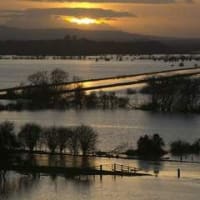

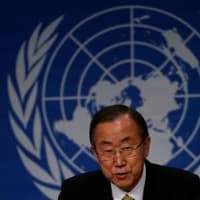
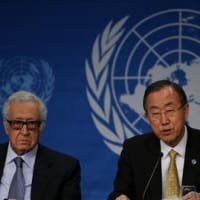
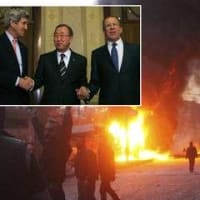

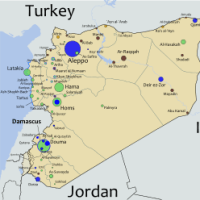
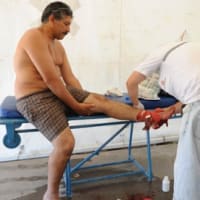
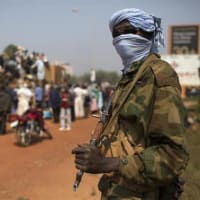

※コメント投稿者のブログIDはブログ作成者のみに通知されます